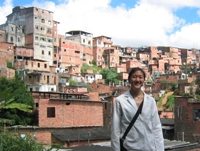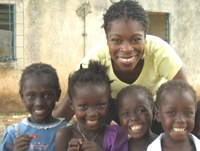Gathered back together from their far-flung locales, 14 medical students from Weill Cornell Medical College shared their summer international elective experiences at a reception hosted by the Office of International Medical Education on October 17 in A-950. With animated narratives and riveting slideshows, each student traveler presented a travelogue of what they did in the host country, including their clinical interactions, study of public health issues, and immersions in local culture and language. The students took part in various projects, including working with street children in India, a community health clinic in rural Bolivia, and the emergency medical services in Israel.

Connie Chen stands before the favelas of Pau da Lima, Brazil, where she studied the risk factors in leptospiral infections.
Dr. Madelon Finkel, professor of clinical public health and director of the Office of International Medical Education (OIME), said she organized the evening to whet the appetites of first-year students for studying abroad, and to introduce them to students who could offer advice about summer electives.
Many students traveled to Latin America. Second-year student Connie Chen traveled to the urban slums of Brazil to study the risk factors in leptospiral infections, transmitted by floods of contaminated sewage. Chen was able to observe and quantify the causative factors of infection, including bare feet, untreated cuts, heavy flooding and sightings of rats, whose urine transmits the infection. She measured outcomes such as fever and screened blood for antibodies indicative of the disease. Chen also took part in community outreach through hypertension screenings and community education for better health.

Karen Adler checks a young patient's fever in one of India's crisis centers for poor children.
Second-year student Melissa Frey traveled to Quito, Ecuador, under the Child Family Health International program, which combines research with hospital work and language studies. She visited communities, worked at clinics (including a maternity and military hospital) and completed an intensive course in medical Spanish. She also conducted a research project on vitamin-A deficiency.
Students urged those interested to make a commitment to study the language and educate themselves about the political and cultural history of the host country—for both enrichment and perspective. Ashita Batavia, another second-year student, found herself reeling in the tailspin of Haiti's political turmoil, which manifested itself through "an epidemic of rape." She worked in Port-au-Prince at the Weill Cornell-affiliated GHESKIO, a center that provided a haven for the country's wave of rape victims—often single, educated women in their twenties who had fallen victim to politically-charged violence.
Karen Adler, '08, worked with a pediatric advocacy group in India on behalf of the country's masses of marginalized children. "There were lines camped outside the hospital for weeks," she said. In her work at a crisis center, she drew upon her master's degree in psychology to design a substance-abuse support group workshop that was kid-friendly and supportive.

Joyce Imahiyerobo smiles with some young Gambian villagers, who jump at the rare opportunity to have their picture taken.
Second-year students Joyce Imahiyerobo and Nneka Offor traveled to Gambia in western Africa to study the role of community health insurance. Both of Nigerian descent, their experience cut close to their hearts. They echoed their colleagues in stressing the importance of remaining flexible at all times; projects often take shape in ways unforeseen, they said. The women split their time between the cosmopolitan, Atlantic-coast cities and the more hardscrabble inland villages. They assisted with a traveling clinic for pregnant women and children, in which midwives set up camp beside a tree. Since most women were illiterate, a thumbprint served as their method of informed consent.
In China, Kenneth Hung was struck by the country's glaring division of wealth—embodied by state-of-the-art MRI machines and gleaming marble hospital lobbies, but also a conspicuous lack of access to health care, with patients spending hours and even days waiting to see the doctor. That more affluent patients can "buy" access to more readily available doctors only deepens the chasm. Hung's conversational Mandarin proved an asset in his hospital work—as did his English, a sought-after language skill in the medical community. "Even if you don't feel you have enough clinical skills," he told the first-year students, "you have your English."
The summer international elective program is a popular way for students to apply their knowledge of and skills in epidemiology, community health and preventive medicine, says Dr. Finkel. Approximately 15 percent to 20 percent of the first-year class takes an international elective. Funding is provided by the Office of Financial Affairs through the work-study program and by the OIME.
Photos courtesy of Connie Chen, Karen Adler and Nneka Offor.

